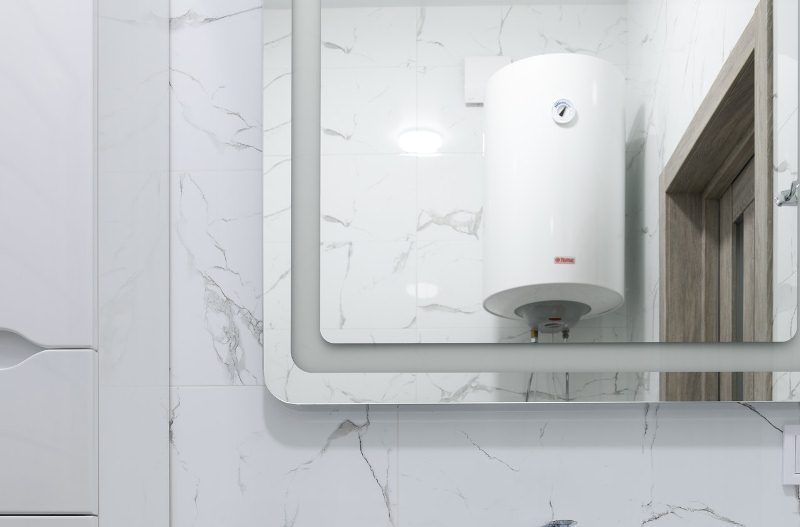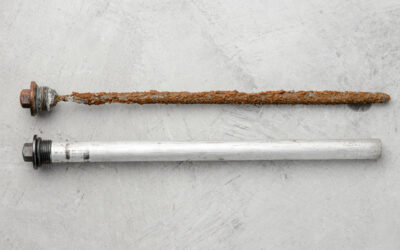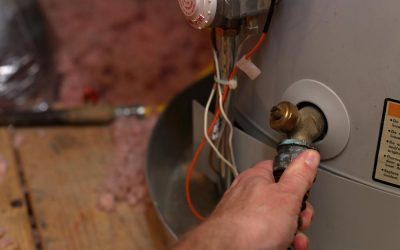Water heater anode rod aluminum vs magnesium, which is better? If you are asking this question, you are probably seeking to know the difference between the two types of anode rods.
An anode rod helps protect your water heater from corrosion, and the most common types of materials that can be used are aluminum or magnesium.
Most people don’t know which material is better and why they should choose one over the other.
So in this article, we are going to look at aluminum and magnesium anode rods and their differences. We will also answer some questions about the two anode rods that people often ask.
What is an anode rod in a water heater?
An anode rod is a metal rod that is inserted into a water heater in order to protect it from corrosion.
The rod is made of a material that is more chemically reactive than the metal of the water heater tank. This way, when water flows over the anode rod and creates an electrical current, it will corrode instead of the metal in the tank.
So the anode rod acts as a sacrificed element and protects the tank from rusting.
If your water heater doesn’t have an anode rod, then it will corrode much faster and you will likely need to replace it more often.
What is anode rod made of?
Do you know what your water heater anode rod is made of?
The best materials for anode rods are ones that have a low corrosion rate and can withstand high temperatures.
Some common materials that are used for anode rods include aluminum, magnesium, and aluminum-zinc alloy.
- Aluminum: This is a good choice for an anode rod because it has a low corrosion rate and is lightweight.
- Magnesium: This is also a good choice because it has a low corrosion rate and high thermal conductivity.
- Aluminum-zinc alloy: It has a high melting point and low corrosion rate as well so it is a good choice for anode rods.
However, the most common materials for anode rods are magnesium and aluminum.
See also: How to tell if anode rod is bad
Aluminum anode rod for water heater
If you have a water heater, chances are it has an anode rod made of either aluminum or magnesium.
However, Aluminum anode rods are less common than magnesium, but they offer a few advantages.
Advantages and disadvantages of aluminum anode rods
Advantages
1. Don’t corrode as quickly as other types of anodes so they last longer
2. Offer better protection against corrosion in highly acidic water
3. They are much cheaper than magnesium and aluminum-zinc alloy anode rods
4. If you have hard water, an aluminum anode rod is a better choice
5. They are easy to install and replace
6. Lightweight and easy to handle
7. Highly effective at preventing scale build-up in your water heater
Disadvantages
1. Aluminum anode rods have slightly lower electrochemical capacity compared to magnesium anodes. So, they do not produce a very strong electrical current like magnesium.
2. They tend to naturally accumulate a build-up of corrosive materials resulting in a thin layer of Al2O3. As this layer builds up, it becomes less effective at protecting the metal tank underneath from corrosion.
What is an Aluminum anode rod mainly used for?
Apart from water heaters, Aluminum anodes are also used in the cathodic protection of pipelines and other buried or submerged metallic structures.
The anode sacrificial action protects the pipelines or structures from corrosion.
Are aluminum anode rods safe?
There is some concern that using aluminum anode rods in water heaters may cause a health risk, as the aluminum can dissolve into the water.
However, most experts agree that the levels of aluminum present in hot water from a water heater are not high enough to pose a health risk.
In any case, if you are concerned about this issue, it is easy to check with your local water authority or utility company to see what type of anode rod they recommend for your area.
Magnesium anode rod for water heater
The magnesium anode rod works similarly to the aluminum anode rod by helping to extend the life of your water heater.
The magnesium will corrode instead of the metal in your water heater, which will help to keep it in good condition for longer.
So, what are the benefits of choosing a magnesium anode rod over an aluminum one?
Advantages
1. Magnesium anode rod has a higher electrochemical capacity than aluminum so it produces a strong electrical current
2. If you have soft water, a magnesium anode rod is a good choice
3. It does not accumulate build up easily
4. Helps to extend the life of your water heater since it corrodes faster than other metals
5. Dissolves completely over time; magnesium has health benefits
Drawbacks
1. Magnesium anode rod may react with bacteria and cause an awful sulfur smell
2. It is more reactive than aluminum so it does not last long in acidic water
3. Corrodes more quickly than aluminum anode rods
4. More expensive
What does a magnesium anode rod do?
A magnesium anode rod is used to protect metal surfaces from corrosion.
It is often used in water heaters, boilers, and other metal storage tanks.
The magnesium rod sacrificial anode release magnesium ions in the presence of water, forming a barrier that protects the metal surface from corrosion.
How long do magnesium anode rods last?
Magnesium anode rods can last for about six years on average. But, it really depends on the water conditions in your geographical area.
If you have extremely hard water, or water with high mineral content, your anode rod will likely not last as long.
To prolong the life of your anode rod, be sure to check it regularly and replace it when necessary.
You can usually tell when it’s time to replace your anode rod because it will appear significantly smaller than when you first installed it.
Can you use magnesium anodes in salt water?
Although you can use your magnesium anodes in saltwater, it is not recommended.
This is based on the fact that magnesium is very reactive hence the anode rods will corrode at a very high rate and deteriorate leaving your water heater unprotected.
Some people argue that you can use an appropriate corrosion-resistant coating on the magnesium anode, but the best solution is to find another option. Aluminum and zinc anode rods for instance are less reactive and can perform better in salty water.
See also: Can you use FRP panels for shower walls?
Aluminum vs magnesium anode rod smell
The aluminum anode rod tends to produce a strong, ammonia-like smell, whereas the magnesium anode rod tends to produce a more chlorine-like smell.
Neither of these smells is particularly pleasant, but they’re both fairly mild in comparison to the extremely noxious fumes that can come from a faulty water heater.
So if you’re ever faced with a choice between an aluminum or magnesium anode rod and you’re not sure which one to choose, it might be best to go with the aluminum rod simply because its smell is less overpowering.
Can aluminum and magnesium anode rods can smelly water?
Yes, a corroded magnesium anode rod can cause a rotten egg smell in the water.
This happens when the magnesium or aluminum rod oxidizes and reacts with the water to produce hydrogen sulfide gas. The gas is what gives water the distinctive rotten egg smell.
If you have an aluminum or magnesium anode rod in your water heater and you smell rotten eggs, chances are the rod is corroded and needs to be replaced.
You can check the condition of your anode rod by removing it from the heater and inspecting it for corrosion. If it’s heavily corroded, it’s time for a new one.
See also: Why does only one faucet smell like sulfur or rotten eggs?
Which anode rod is best for hard water?
The best anode rod for hard water will depend on a few different factors, including the type of water heater you have and the hardness of your water.
If you have a traditional tank-style water heater, then you’ll want to choose an anode rod made from either aluminum as opposed to magnesium.
Aluminum is more effective at combating hard water deposits and it is more resistant to corrosion. Magnesium is less effective against hard water; it is more prone to corrosion.
If you have a tankless water heater, then you’ll want to choose an anode rod made from zinc. Zinc is more effective against hard water than aluminum or magnesium.
Which is the best anode rod for softened water?
Magnesium anode rods are generally considered to be the best option for most people. This is because they’re less likely to cause problems with mineral buildup in your water heater.
See also: How to make water hotter in an electric water heater
Water heater anode rod aluminum vs magnesium, which is better?
So, are you wondering which is better magnesium or aluminum anode rod and which one to choose?
Well, based on the above analysis, both have their advantages and disadvantages.
For instance, you can go for a magnesium anode rod since it is more reactive than aluminum, meaning it will corrode first in the presence of water and oxygen. This can help extend the life of your water heater by preventing other metallic parts from corroding.
Also, magnesium produces hydrogen gas when it corrodes. This can help to flush out sediments that have built up in the bottom of your tank, improving efficiency and heat transfer.
Alternatively, you can choose an aluminum anode rod if you live in a hard water area that is acidic because it is more effective than magnesium. It helps to reduce the amount of calcium and magnesium that leach into the water
Aluminum rods are also a good choice if you want something that is affordable yet long-lasting because they corrode more slowly than magnesium.
Conclusion
So, what’s the verdict between water heater anode rod aluminum vs magnesium? Should you switch to an aluminum anode rod or stick with magnesium?
If your water is hard and acidic and you have a lot of sediment in your tank, then switching to an aluminum anode rod may be a good idea.
However, if your water soft and not acidic and you don’t have a lot of sediment in your tank, then sticking with a magnesium anode rod is probably best.
Ultimately, it’s important to test both types of rods in order to see which one works better for your specific situation. Have you tried using an aluminum anode rod or magnesium anode rod in your water heater? Let us know how it went in the comments below.







